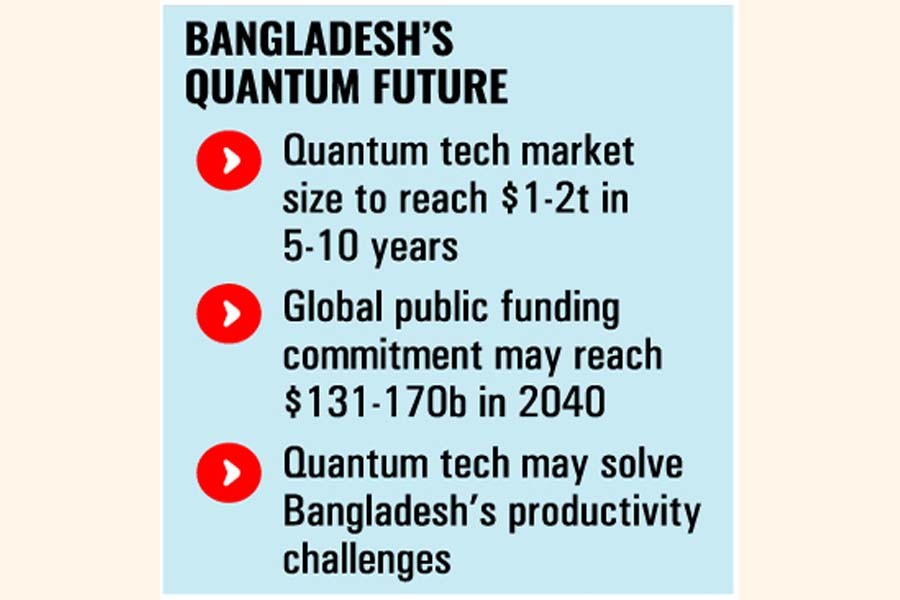
Published :
Updated :

Experts and private sector representatives on Sunday emphasised enabling environment-friendly quantum technology in Bangladesh to claim a considerable share of its growing market.
They said the private sector's share in quantum technology had risen sharply over the years and the market size would reach $1-2 trillion in the next five to 10 years.
Moreover, they said the global combined public funding commitment for quantum technology reached $43 billion in 2023, which could increase to $72-89.7 billion in 2035 and $131-170 billion in 2040.
They made the remarks at a lecture titled "Leveraging Quantum Phenomena: Reimagining the Possible New Worlds" arranged by the Metropolitan Chamber of Commerce and Industry (MCCI) at its Gulshan office in the capital.
Dr Sam Samdani, interim chief executive officer of QuantumCT and external adviser at McKinsey & Company, presented the keynote at the event.
In the keynote, he emphasised the transformative potential of quantum technology-based services to enhance productivity and reduce operational costs across industries, describing the technology as a pivotal driver of the future of global business.
He highlighted the 2024 key insights of quantum technology, saying IBM achieved a 100x improvement in error correction with 288 qubits, Quantinuum set records for qubit reliability by enhancing noise resilience, and Alice & Bob improved efficiency through 100 reliable logical qubits and the use of innovative cat qubits.
Samdani also said the demand for quantum talent still outpaces supply, even though universities and stakeholders are expanding training programmes.
He highlighted the real use of quantum technology, saying quantum satellites and short-distance quantum communications (less than 500km) have been implemented, while quantum credit cards and city-to-city networks are closer to production with advancements in repeaters and push-to-talk over cellular (PoC) networks.
"Investments in quantum technology are surging worldwide," he noted, highlighting its adoption in leading economies, such as China, Germany, the US, the UK, and South Korea.
Samdani further elaborated on how quantum innovations could address pressing global challenges like climate change and inefficiencies in the existing technologies.
Professor M Tamim, vice-chancellor of Independent University Bangladesh, was the chief guest, while Habibullah N Karim, vice-president of MCCI; M Anis Ud Dowla, chairman of ACI; and others also spoke at the event.
Tamim said careful consideration is necessary for adopting advanced technologies like quantum computing in Bangladesh.
"Quantum technology has the potential to solve productivity challenges and other pressing issues facing our nation," he remarked.
He also emphasised the need to integrate emerging technologies into the country's education system, saying focusing on technology education is essential to build a sustainable and future-ready workforce.
The discussion concluded with a consensus on the importance of preparing Bangladesh to leverage quantum technology as a strategic tool for economic growth and sustainability.
jahid.rn@gmail.com


 For all latest news, follow The Financial Express Google News channel.
For all latest news, follow The Financial Express Google News channel.